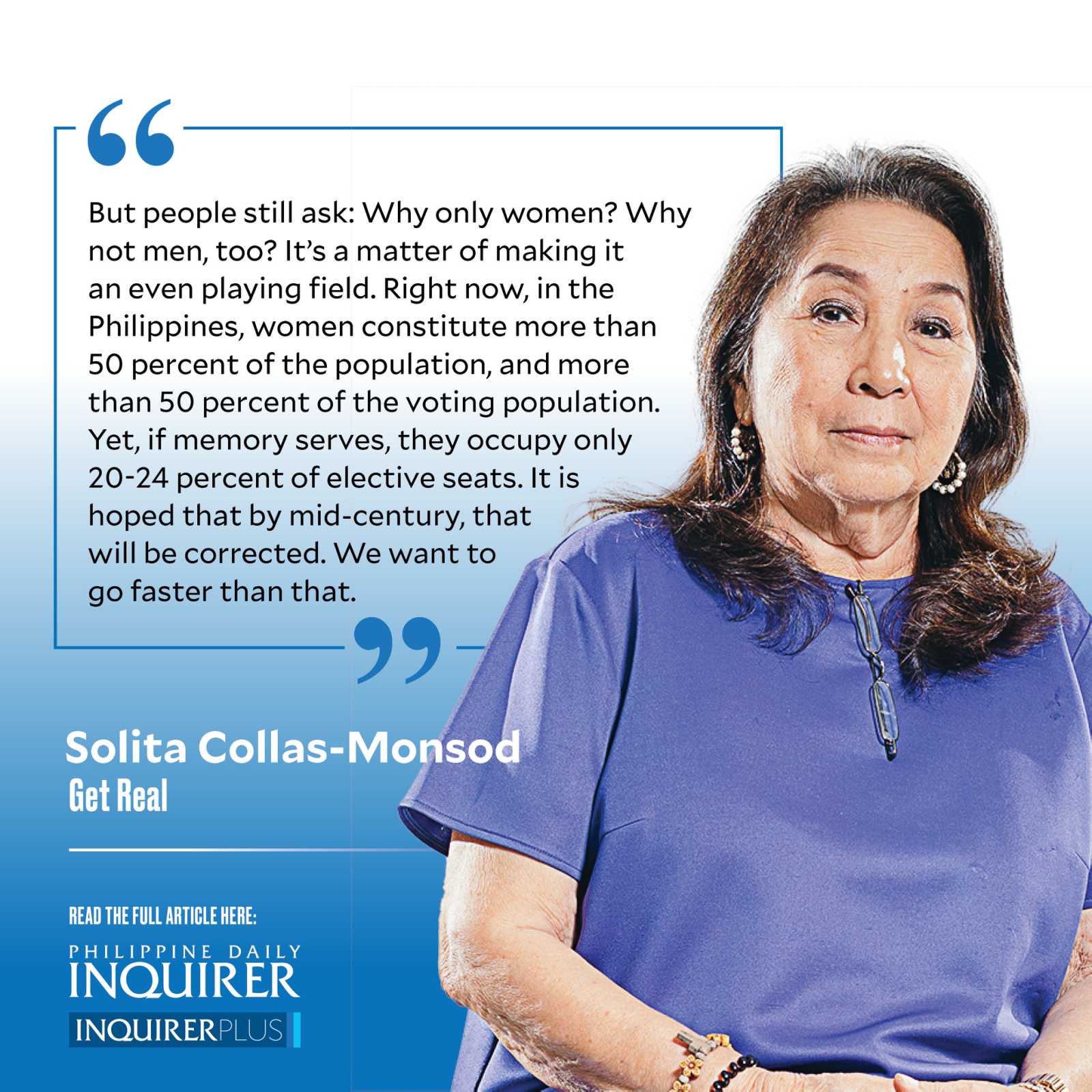Time for women to be put in charge

Here’s the latest, Reader, on our crowd-funding project which aims to invest in good women leaders and transform how political leaders are financed. We started the fund (LetWomenLead) by opening a bank account in the BPI last Sept. 20 (BPI 0290-0110-73 under Cecilia Lazaro and Solita Collas-Monsod). Eleven days later, the account stands at P1,985,469.41 (as of 11 a.m., Friday, Oct. 1). This from 532 transactions, with a transaction possibly representing at least one person, but including as much as 18 people. That shows that we have only scratched the surface.
You know, Reader, that AWARE—the Alliance of Women for Action toward Reform—is managing the project, and is currently incorporating itself as an NGO after 39 years of existence. Rina Filart, Olivia Ferry, and Lot Ortiz-Luis have been part of the process of deciding which women to support. They are well-known in the NGO and civil society worlds.
Article continues after this advertisementThere will be a soft opening of the LetWomenLead.org by tomorrow or Monday, and there will be a formal launch on Oct. 14.
Reader, AWARE could not have gone this far without the help of so many volunteers who, unfortunately, prefer to remain anonymous given the vindictiveness of this government. There are so many stories of harassment by the BIR, the NBI, etc. Cheche and I have been cautioned any number of times, and would have preferred also to remain anonymous, but then, there would have been no bank account to deposit donations into. But to show you how great the threat is, the BDO and the GCash account openings have been suspended.
Don’t worry, though. The website will have a payments gateway—and BDO, GCash, and many more will be part of that gateway. Just a little bit more patience, folks, and then we can all go to town, with the networks forever widening, and the people contributing not only of their financial resources, but of their time and talent as well.
Article continues after this advertisementI get the feeling this is going to be like an Edsa people power, but it will not require the physical presence of the people, just their virtual presence, using information and communications technology to get the job done. Remember what that job is: to be able to fund good leaders who will no longer have a taipan or a big corporation to answer to, but the Filipino people who have given of their substance, not of their excess.
What a complete transformation of Philippine politics that will be: from a situation where candidates buy the people’s votes, to a situation where the people give the candidates money for their elections. From a situation where the oligarchs finance the winners, to a situation where the people themselves do that. Truly, a consummation devoutly to be wished.
But people still ask: Why only women? Why not men, too?
It’s a matter of making it an even playing field. Right now, in the Philippines, women constitute more than 50 percent of the population, and more than 50 percent of the voting population. Yet, if memory serves, they occupy only 20-24 percent of elective seats. It is hoped that by mid-century, that will be corrected. We want to go faster than that.
Will the situation get better with more women in power? You bet. I’ve discussed to death the finding that women-led countries did much better at handling the pandemic than men-led countries. That’s a given. But why?
“The evidence shows that female leaders typically have more compassion and empathy, and a more open and inclusive negotiation style. This is not, of course, necessarily true of all women—there are many different leadership styles. That said, modern ideas of transformative leadership are more in line with qualities women generally share: empathy, inclusiveness and an open negotiation style.” This from Gwen K. Young, director of the Women In Public Service Project housed at the Woodrow Wilson International Center for Scholars.
“Yet evidence is strong that as more women are elected, countries experience higher standards of living; the priorities of families, women and minorities are addressed; and confidence in democracy goes up.” This from the National Democratic Institute.
And given that the Philippines is among the bottom feeders when it comes to economic performance and the management of the pandemic (the two are closely related), it is time that women (of the right kind) are put in charge.
——————
solita_monsod@yahoo.com
















